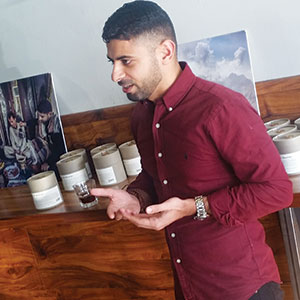

In a Santa Clara strip mall, Mokhtar Alkhanshali is reciting mystic Sufi poetry about the virtues of caffeine. A capacity crowd at Chromatic Coffee on Stevens Creek Boulevard listens intently as Mokhtar, the only Yemeni-American coffee magnate ever to be profiled in a Dave Eggers book, talks about his company, Port of Mokha and specifically its new limited edition release of Al-Durrar from Yemen.
He delivers a fantastic educational speech about coffee and its roots with the ancient Sufis. Chromatic is jammed to the gills, with many customers shelling out $42 for 6 ounces of roasted Yemeni coffee in custom-packaged units.
Alkhanshali’s coffee escapades already made him a celebrity before Eggers wrote his book about him, The Monk of Mokha, which releases next month. The story is a remarkable one. As a little kid, Alkhanshali grew up with his immigrant parents in the Tenderloin area of San Francisco. “I didn’t even like coffee,” he told the capacity crowd. “I never drank it at all.”
Then after stumbling on a taste of specialty coffee with hints of blueberry, honey and tea-type flavors, he was hooked and went on to learn everything he could, eventually becoming the first Arab to obtain Q-grader status, loosely equivalent to a sommelier in the wine world. After that, he bailed back to the land of his ancestors, ambitious to help restore Yemen’s place at the top of world’s coffee industry. He trained farmers, lived with their families and devised a plan to bring them up to speed with the modern world.
Then things got ugly. In March 2015, civil war engulfed Yemen and airports were bombed out, with no civilian flights remaining and no U.S. government presence on the ground anywhere. Alkhanshali had two suitcases filled with priceless coffee samples that he was planning to bring to a coffee conference in Seattle, but he had no way to get out of the country. He wound up hiring a fisherman to sneak him across the Red Sea to Djibouti on the Horn of Africa. From there, Alkhanshali made it to Kenya, Amsterdam and finally Seattle with prized Yemeni coffee that blew away a good portion of the competitors at the conference. His journey received press all over the world.
These days, Yemen is still a dangerous place riddled with war and disease, with the coffee crop being one of the few ways farmers can make any money. Last Sunday marked the first time a local South Bay coffee shop has partnered with Alkhanshali to bring his products to the general public. The customer must decide what he or she is actually spending money onthe coffee or the perception of charitybut in any event, the $42 limited release of Al-Durrar originated with hand-picked red berries in thousand-year-old villages 7,700 feet above sea level, where the elevation leads to a variety of factors, including smaller, denser beans with higher lipids.
“The environment causes this perfect storm that helps create this luscious, delicious cup of coffee that we haven’t really experienced much in other varieties,” said Hiver van Geenhoven, Chromatic’s lead coffee roaster.
To an attentive crowd at Chromatic, Alkhanshali provided a layman’s overview of coffee history. Depending on who you ask, coffee originates in either Ethiopia or Yemen, or somewhere between. For sure, though, Yemen was the first place to export a commercial coffee product beginning in the 16th century. Even today, most of the world’s coffee can be genetically traced all the way back to ancient Sufi mystics near the port town of Mokha, hence the name of Alkhanshali’s company. To the Sufis, coffee was a spiritual beverage, inseparable from poetry and the mystical experience. The word coffee even originates with the Arabic word qahwa.
At Chromatic, Otessa Crandell, the cafe’s manager, seemed ecstatic about this new partnership with Port of Mokha. It’s an amazing cause, helping Yemeni farmers via a luxury product here in Silicon Valley.
“As a company and as a culture of the cafe, we always want to do more than just make money,” Crandell said. “I don’t ever want this space to be just a revenue stream or just a source of income. We need to use the platform and use the space to do more. And that’s what made this story so special, and so unique and so important to us to work with.”



